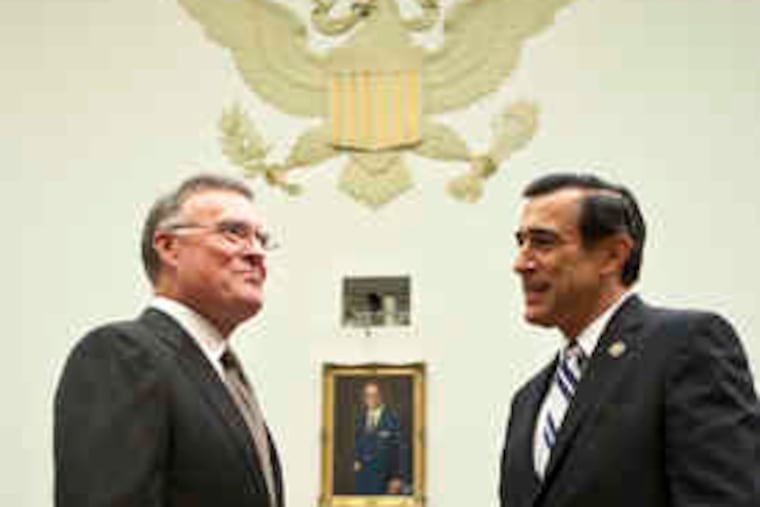Lawmakers blast dealing on Merrill
WASHINGTON - House lawmakers yesterday accused federal regulators of a gross misuse of power in orchestrating a "shotgun wedding" between Bank of America Corp. and Merrill Lynch & Co. Inc. that cost U.S. taxpayers $20 billion.

WASHINGTON - House lawmakers yesterday accused federal regulators of a gross misuse of power in orchestrating a "shotgun wedding" between Bank of America Corp. and Merrill Lynch & Co. Inc. that cost U.S. taxpayers $20 billion.
They also took aim at Bank of America chief executive officer Kenneth D. Lewis, questioning whether he played dumb last fall as Merrill's financial losses mounted and threatened not to go through with the merger to squeeze money from the government.
"Why did a private business deal announced in September and approved by shareholders in December - with no mention of government assistance - end up costing taxpayers $20 billion in January?" asked Rep. Edolphus Towns (D., N.Y.), chairman of the House Oversight and Government Reform Committee.
The panel has been investigating the deal, including whether federal officials pressured Lewis and urged him to keep quiet about Merrill's financial problems. Not divulging the information would have violated Lewis' fiduciary duty to shareholders.
In testimony before the committee, Lewis said publicly for the first time that his job was threatened after he expressed second thoughts about the merger. Lewis said Henry M. Paulson Jr., treasury secretary at the time, and federal regulators made clear that if the bank reneged on its promise, they would force his ouster and that of board members.
"What gave me concern is that they gave that threat to a bank in good standing," Lewis said. "So it showed the seriousness with which they thought that we should not" back out.
Paulson and Federal Reserve Chairman Ben S. Bernanke also pledged government aid to Bank of America to help absorb the losses, Lewis said.
Bank of America received $45 billion from the government's bank-bailout program, $20 billion of which was tied to its acquisition of Merrill.
Lewis said he was never asked by Paulson or Bernanke to withhold information from shareholders. However, Lewis said Paulson told him in a telephone call that the government was reluctant to put the terms of the deal in writing because it would have prompted public disclosure.
The Federal Reserve declined to comment on Lewis' testimony.
A spokeswoman for Paulson has said the former treasury secretary felt a letter would have been too vague to help Bank of America and would only rattle markets by creating more questions than answers. She said questions about disclosures by the bank were left to Bank of America.
Lawmakers on the committee said they were troubled by Lewis' testimony as well as internal Fed documents related to the deal.
In one e-mail, Bernanke said he thought Lewis' threat to pull out of the deal was a "bargaining chip" and "we do not see it as a very likely scenario at all."